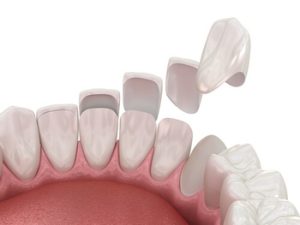Tooth sensitivity can be frustrating, making everyday activities like enjoying a hot coffee or cold ice cream uncomfortable. Whether it’s sharp tooth pain or that irritating zinger from cold foods and drinks, sensitive teeth can influence your daily life in ways you might not have realised. But did you know that dental veneers may offer relief? If you’ve been wondering, “Do veneers help with sensitive teeth?” you’re not alone. Let’s explore how veneers can help manage tooth sensitivity while enhancing your smile.
Why Do Teeth Become Sensitive?
Sensitive teeth are frequently caused by problems with the tooth enamel, the protective outer layer of your teeth. When enamel wears down or becomes damaged, it exposes the inner layers, such as the dentin, which contains tiny tubes that link to the tooth’s nerve endings. This exposure allows hot, cold, or acidic foods and beverages to affect these sensitive areas, resulting in discomfort or pain. Common causes of tooth sensitivity include:
- Enamel erosion from acidic foods and drinks
- Gum recession that exposes the tooth’s roots
- Tooth decay and damaged teeth
- Teeth grinding, which wears down the enamel
In some cases, sensitivity can occur after certain dental treatments. Temporary tooth sensitivity is often experienced after tooth whitening or dental veneer procedures. This is because the tooth enamel undergoes preparation, and the protective enamel layer may temporarily thin.
What Exactly Are Dental Veneers, and How Do They Function?
Dental veneers are customised thin shells that cover the frontal surface of your teeth. They are usually crafted from either porcelain or composite resin materials and offer a natural appearance to improve your smile’s aesthetics and function. These shells are attached to your natural teeth to correct issues like misshapen teeth, crooked teeth, or gaps between teeth.
But beyond cosmetic concerns, veneers can help protect sensitive teeth. When applied to your natural teeth, veneers act as a protective barrier, covering the tooth’s surface and shielding it from further erosion and external factors that cause discomfort. Whether your sensitivity is caused by enamel erosion or gum recession, veneers can help manage tooth sensitivity by creating an additional protective layer over your teeth.
How Do Veneers Help with Sensitive Teeth?
If you’ve ever asked yourself, “Do veneers help with sensitive teeth?” the answer is a resounding yes for most patients! Here’s how:
- Creating a Barrier: Veneers form a shield over the exposed dentin layer, preventing foods and drinks from irritating the tooth’s nerve endings. Veneers can significantly reduce temperature sensitivity, whether you’re sensitive to hot or cold foods.
- Protecting Damaged Enamel: Dental veneers cover the entire tooth surface, offering a new, smooth layer that enhances your smile’s function and look. This protective layer can reduce tooth pain caused by enamel erosion or tooth decay.
- Restoring Aesthetics and Health: Along with reducing sensitivity, veneers provide a confident smile makeover by correcting cosmetic issues like misshapen teeth, crooked teeth, and discolouration. With veneers, you don’t just protect your sensitive teeth—you also get a whiter smile and improved oral health.
Do Porcelain Veneers Work Better for Sensitive Teeth?
For sensitive teeth, porcelain veneers tend to be more effective than composite resin. Porcelain is a durable material that better shields the tooth’s surface from temperature changes and acidic foods, providing longer-lasting relief from tooth discomfort.
That said, the best option depends on your individual needs, and your dental professional will recommend what suits your specific case. Both porcelain and composite resin materials can address sensitivity, but porcelain veneers are typically more wear-resistant and tend to last longer.
What Is the Veneer Procedure Like for Sensitive Teeth?
If you’re considering veneers to manage your tooth sensitivity, you may wonder about the dental veneer procedure. Here’s a breakdown:
- Initial Consultation: At your initial appointment, your dentist will carefully assess your teeth to see if veneers are a suitable option for you. They will also examine for any underlying conditions, such as tooth decay or gum disease, that must be addressed before proceeding with the treatment.
- Tooth Preparation: The process requires the removal of a small layer of enamel to create space for the veneers. Although this may seem like it could heighten sensitivity, it’s a minimal procedure, and any resulting discomfort is usually short-lived. Temporary veneers may be utilised while the permanent ones are being fabricated.
- Veneer Placement: When your new veneers are finished, your dentist will attach them to the front surfaces of your teeth, covering the entire tooth surface. This thin layer helps protect against further erosion and effectively manages tooth sensitivity.
- Post-Procedure Care: You may experience temporary sensitivity after the veneer procedure, but this typically subsides as your teeth adjust to their new protective layer. A soft-bristled toothbrush and avoiding very hot or cold foods can help minimise minor discomfort during this period.
Managing Tooth Sensitivity with Veneers
After getting veneers, it’s essential to maintain good oral health to prolong the life of your veneers and keep tooth sensitivity at bay. Here are some tips for managing sensitivity and maintaining your smile after the procedure:
- Use a soft-bristled toothbrush: Hard-bristled brushes can wear down the enamel and cause gum recession, which may lead to increased sensitivity.
- Avoid acidic foods: Foods and drinks high in acid, like citrus fruits and sodas, can contribute to enamel erosion, even with veneers. Minimising these will help preserve both your natural tooth structure and your veneers.
- Stick to cold foods and drinks with caution: Cold food may still trigger some sensitivity in the days following the veneer procedure, so it’s best to avoid very cold items until you feel more comfortable.
- Regular dental check-ups: Schedule regular appointments with your dentist to keep both your veneers and natural teeth in good health. Routine check-ups are crucial for monitoring any potential issues, such as gum recession or enamel wear.
What Foods Should You Avoid with Veneers?
After getting veneers, you’ll want to take extra care to avoid foods and beverages that can affect the longevity of your veneers and contribute to increased sensitivity. Here are a few to avoid:
- Hard foods like nuts and ice that can chip or crack your veneers
- Sticky foods, such as chewing gum or caramel, can potentially dislodge the veneer
- Foods and drinks with strong pigments, such as red wine, coffee, or berries, can stain veneers over time, particularly composite resin veneers.
- Hot or cold foods during the primary healing period to avoid increased sensitivity
While veneers are designed to be durable, following these precautions will help ensure they stay in great shape for years.
Are There Risks Involved with Veneers for Sensitive Teeth?
 While veneers are considered a safe and effective dental solution for managing tooth sensitivity, they may not be suitable for everyone. Following your dentist’s advice and discussing any concerns about long-term tooth sensitivity or potential risks is essential. Some patients may experience abnormally increased sensitivity after the procedure, though this is usually temporary.
While veneers are considered a safe and effective dental solution for managing tooth sensitivity, they may not be suitable for everyone. Following your dentist’s advice and discussing any concerns about long-term tooth sensitivity or potential risks is essential. Some patients may experience abnormally increased sensitivity after the procedure, though this is usually temporary.
Veneers should also be cared for diligently, as improper oral care or ignoring dental check-ups can lead to problems such as gum inflammation or enamel erosion around the edges of the veneers. Most patients, however, find that veneers significantly reduce their sensitivity and improve their overall dental health and appearance.
Are Veneers the Right Solution for Sensitive Teeth?
While dental veneers can significantly reduce sensitivity, it’s important to determine if they fit your specific dental needs. Here are a few factors to consider when deciding if veneers are the ideal solution for managing tooth sensitivity:
Extent of Sensitivity
Veneers work well for people who have mild to moderate tooth sensitivity caused by enamel erosion, gum recession, or minor damage. If your sensitivity is severe or caused by more serious dental issues like advanced gum disease or tooth decay, your dentist may recommend addressing these concerns first before considering veneers.
For many people, veneers provide a more comfortable experience, especially if they’re dealing with increased sensitivity to cold foods and drinks. However, the root cause of sensitivity must be treated to ensure long-term relief.
Dental Health and Existing Problems
Before getting veneers, you need to ensure that your oral health is in good condition. If you have dental caries, gum disease, or damaged teeth, your dentist will need to treat these problems first. Veneers are not a solution for dental health issues that require more extensive interventions, but they can help protect healthy teeth from future damage. Always prioritise your oral health over cosmetic treatments.
Cost and Maintenance
Veneers are an investment, and while they provide excellent protection for sensitive teeth, it’s essential to be mindful of the costs involved. The cost of veneers can differ based on whether you decide on porcelain veneers or composite resin veneers, and you’ll also need to consider long-term maintenance.
Porcelain veneers are more durable and long-lasting, making them a great option for sensitivity management. However, composite veneers are less expensive and can still provide relief from sensitivity, although they may need to be replaced more often.
Cosmetic and Health Benefits
If you have sensitive teeth and cosmetic concerns like crooked, misaligned, or discoloured teeth, veneers can give you the best of both worlds. You’ll experience relief from sensitivity while also enjoying a more aesthetically pleasing smile.
Veneers are particularly helpful for those looking to improve their smile with whiter teeth and a confident smile without undergoing more invasive procedures. This cosmetic treatment enhances both the function and appearance of your teeth, providing long-term solutions for sensitive teeth and cosmetic concerns.
Achieve a Confident Smile While Managing Tooth Sensitivity
 Dental veneers might be the ideal solution if you’re tired of living with tooth discomfort. Not only do veneers provide relief from sensitive teeth, but they also give you a stunning smile makeover, addressing cosmetic concerns like misaligned teeth, gaps, or discolouration.
Dental veneers might be the ideal solution if you’re tired of living with tooth discomfort. Not only do veneers provide relief from sensitive teeth, but they also give you a stunning smile makeover, addressing cosmetic concerns like misaligned teeth, gaps, or discolouration.
While veneers are an investment, they offer long-term benefits for your oral health and confidence. If you’re ready to protect your teeth from further damage and manage your sensitivity, it’s time to consider this transformative cosmetic treatment.
Consult with our professional dentist to see if veneers are right for you. Whether you’re dealing with temperature sensitivity, enamel erosion, or sharp tooth pain, veneers could answer your aesthetic and oral health needs. With adequate care and regular dental visits, your new veneers can keep your smile radiant and sensitivity-free for years to come.
Don’t hesitate to contact Beyond Infinity Dental at (02) 8806 3799 for more personalised advice or to explore whether veneers are the right option for your sensitive teeth.
References:
Healthline. (n.d.). Foods that stain teeth. https://www.healthline.com/health/foods-that-stain-teeth#:~:text=Blackberries%2C%20blueberries%2C%20pomegranates%2C%20and,lead%20to%20more%20persistent%20stains
WebMD. (n.d.). Veneers: What you should know. https://www.webmd.com/oral-health/veneers
Cleveland Clinic. (n.d.). Teeth sensitivity. https://my.clevelandclinic.org/health/symptoms/10954-teeth-sensitivity
Corsodyl. (n.d.). Receding gums: Causes and treatment. https://www.corsodyl.co.uk/gum-disease/receding-gums/









